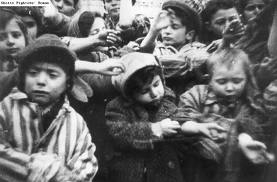by: Lorraine Array
January 22, 2015
"After Auschwitz, the human condition is not the same, nothing will be the same."
- Elie Wiesel
January 27th marks the 70th anniversary of the liberation of Auschwitz Birkenau Concentration Camp by the Russian army at the end of World War II. For those who were able to survive the horrors of Auschwitz, finally hearing the words “We’re free! We’re free!” echoing across the camp barracks must have seemed almost too good to be true. We often hear stories of the initial encounter between camp survivors and the liberating army, recounted by one child survivor, “They gave us hugs, cookies, and chocolate. Being so alone, a hug meant more than anybody could imagine because that replaced the human worth that we were starving for. We were not only starved for food but we were starved for human kindness.”
People rarely consider what happened to the anti-Semitism that was at the root of the Holocaust once the war ended. There is sometimes an assumption that anti-Semitism ended with the war or that it was greatly diminished. In fact, this is never the case when genocide occurs. The hatred and prejudice still exist, but their manifestation is not always blatantly obvious. In the case of the Holocaust, the world felt a collective sense of shame in facing the images of survivors, which was a strong inhibiting force against the blatant expression of anti-Semitism. Today, decades later and with new generations rising, the erosion of that sense of shame has become a key factor in the surge of anti-Semitism. That's why education is more important now than ever.
After liberation, the survivors of Auschwitz were free to walk out of the camp, and were essentially on their own to make their way back to their communities and learn if their former homes and valued possessions were still there. Many of the young women who survived the camp travelled together in small groups, sometimes for long distances. Sleeping in barns, sheds or outside in the woods, they were frequent victims of violent sexual assaults from marauding soldiers, attacks from which some did not survive. They were targeted for two reasons – because they were women and because they were Jewish.
The liberation of Auschwitz is clearly a critically important event in the history of the Holocaust and one that should hold an important place in our collective memories. But we also need to be mindful that anti-Semitism did not magically disappear with the liberation of the camps or the signing of the peace treaties. Today, anti-Semitism has reached to all-time highs across Europe and our memories need to be tempered with a renewed vigilance to continue to fight anti-Semitism and all forms of prejudice, from subtle stereotypes and Holocaust “jokes” to violent hate crimes against people perpetrated because of who they are. Only then, will the mandate of “Never Again” become a reality.
How do we bring the lessons of the Holocaust to students today in ways that are relevant to their lives? The Anti-Defamation League provides programs and resources that help educators and students study the history of the Holocaust and apply its lessons to contemporary issues of responsible citizenship, moral decision making, prejudice, hate, and genocide. Teachers can integrate multimedia curricula into their classrooms through Echoes and Reflections.










